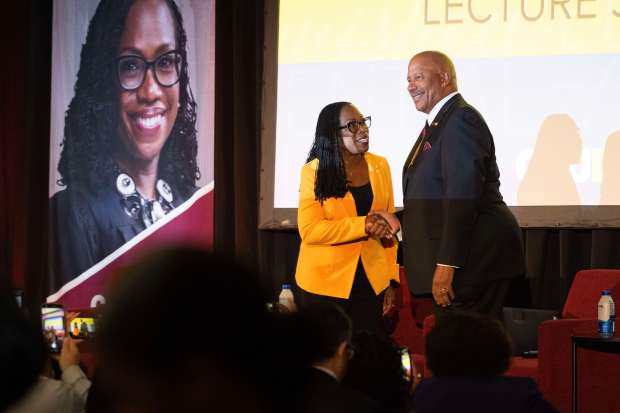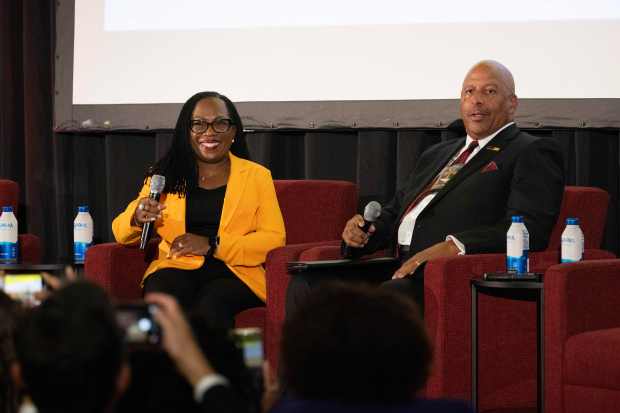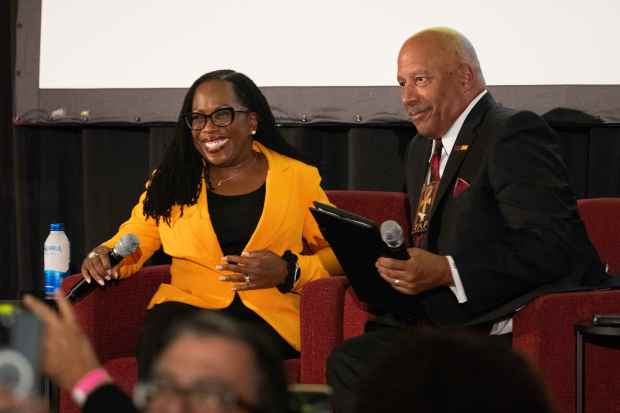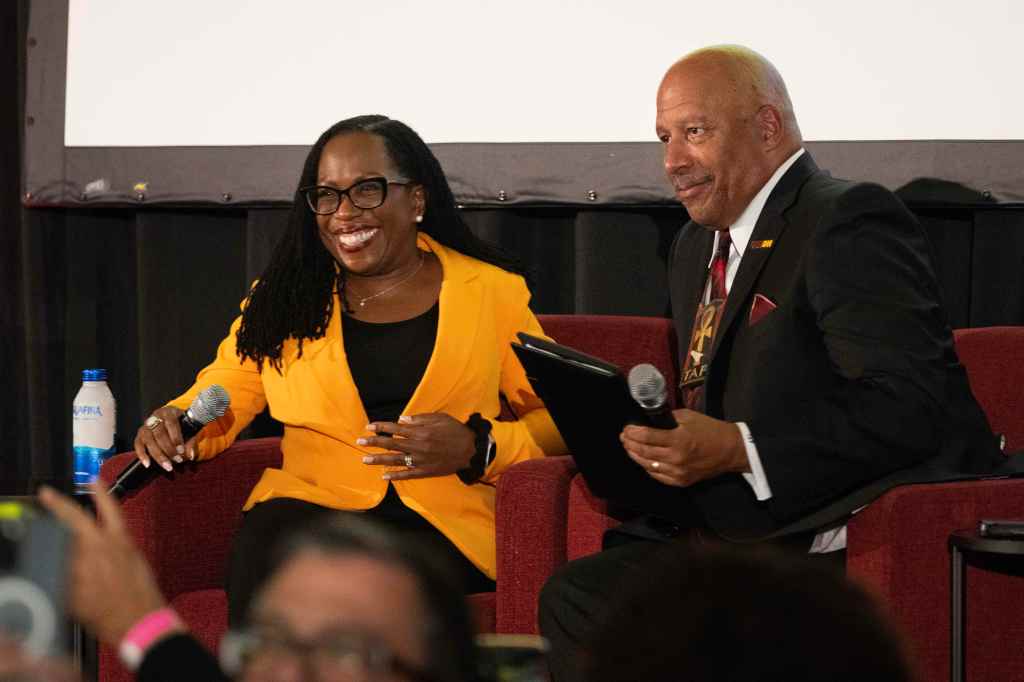Supreme Court Justice Ketanji Brown Jackson paid a special visit to Cal State Dominguez Hills on Thursday, Oct. 23 — as part of the university’s longstanding Presidential Distinguished Lecture Series.
The lecture series was established by CSUDH President Thomas Parham, who is set to retire at the end of this year, in 2018. Since its establishment, CSUDH has hosted several prominent voices across multiple industries, including Los Angeles Mayor Karen Bass, saxophonist Kenny G, Olympian Tommie Smith, and former California Attorney General and U.S. Secretary of Health and Human Services Xavier Becerra, among others.
“This university should be the place where the central issues of our day should become the topics of critical discourse and analysis,” Parham said during Thursday’s event, “and nowhere else in this Southland are you going to find these kind of guests other than right here at your Toro Nation, Cal State Dominguez Hills.”
U.S. Supreme Court Justice Ketanji Brown Jackson poses for photographs during the CSUDH’s Presidential Distinguished Lecture Series in Carson on Thursday, Oct. 23, 2025. (Photo by Drew A. Kelley, Press-Telegram/SCNG)

From right, CSUDH President Dr. Thomas Parham welcomes U.S. Supreme Court Justice Ketanji Brown Jackson to the university’s Presidential Distinguished Lecture Series in Carson on Thursday, Oct. 23, 2025. (Photo by Drew A. Kelley, Press-Telegram/SCNG)

From left, U.S. Supreme Court Justice Ketanji Brown Jackson and CSUDH President Dr. Thomas Parham pose for photographs during the university’s Presidential Distinguished Lecture Series in Carson on Thursday, Oct. 23, 2025. (Photo by Drew A. Kelley, Press-Telegram/SCNG)

From left, U.S. Supreme Court Justice Ketanji Brown Jackson and CSUDH President Dr. Thomas Parham pose for photographs during the university’s Presidential Distinguished Lecture Series in Carson on Thursday, Oct. 23, 2025. (Photo by Drew A. Kelley, Press-Telegram/SCNG)
Show Caption
1 of 4
U.S. Supreme Court Justice Ketanji Brown Jackson poses for photographs during the CSUDH’s Presidential Distinguished Lecture Series in Carson on Thursday, Oct. 23, 2025. (Photo by Drew A. Kelley, Press-Telegram/SCNG)
Jackson, meanwhile, gave a speech reflecting on her life and career in law to the crowd of several hundred attendees, before participating in a fireside chat with Parham and later, a panel discussion with several CSUDH faculty members, including Vice President and DEI officer Bobbie Porter, Asian Pacific Studies chair and associate professor Mary Lacanlale, Africana Studies chair and professor Salim Faraji, and associate sociology professor Joanna Perez.
After graduating Harvard Law School in 1996, Jackson worked in private practice and public service, including three federal clerkships, before becoming a judge on the U.S. District Court for the District of Columbia in 2013, according to the Supreme Court Historical Society. She also served as a commissioner on the U.S. Sentencing Commission.
During her tenure there, according to the U.S. Senate Committee on the Judiciary, Jackson issued more than 500 opinions on various issues, including on separation of powers, collective bargaining rights and the Fourth Amendment.
President Joe Biden appointed Jackson to the U.S. Court of Appeals for the District of Columbia circuit in 2021, the historical society said, then nominated her to the Supreme Court the following year.
Jackson’s nomination was historic, as she was the first Black woman to serve on the Supreme Court. She took her oaths of office on June 30, 2022, making her the fourth woman Supreme Court justice on the nine-member panel.
“Our guest is the smile from the ancestors for the progress she represents. Our guest is an affirming nod to the contemporary generations of elders and adults who thank her for representing the full measure of her cultural essence and integrity, with an uncompromising clarity,” Parham said, “and an aspirational feeling of hope and enlightenment from the younger generations of those yet to be born, these children, who will see in her a symbol of possibility and potential for themselves.”
Jackson’s swearing in took place mere days after SCOTUS issued its final opinions for that term — which included overturning Roe v. Wade’s constitutional abortion rights protections for women across the country.
Since her swearing in, the associate justice has been a vocal critic of President Donald Trump and his sweeping attempts to limit America’s checks and balances of power — which are fundamental to American democracy — and to unilaterally carry out his administration’s agenda, including mass deportations, firing government workers en masse, and pulling federal funding and contracts.
Trump and his allies, for example, have taken to targeting judges that disagree with — or block entirely — his policies, citing violations of the settled law and the Constitution. When the Supreme Court issued an opinion in June limiting the authority of federal judges who have sought to block Trump initiatives via federal injunctions, Brown was among the minority of her colleagues to dissent.
Jackson, during Wednesday’s event, shared the major inspirations that have driven her life and career forward: From her parents’ unwavering efforts to continually pursue education and instill that desire in her, to the Black men and women before her who laid the groundwork for her to pursue the career she has now — like Judge Constance Baker Motley, the first Black woman to argue in the Supreme Court who broke many barriers for women like her in law — and more.
“I feel gratitude for all of those who came before us and who put their hands on the arc and bent it toward justice in a way that allowed me to serve in a position that I now hold,” Jackson said. “We have to understand that history is not linear, that there are ebbs and flows. If people continue to do what is right, to be bold in our actions and thoughts and words — I am confident that we can get through the difficulties that we are currently facing and turn toward a brighter future.”

